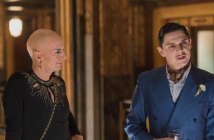September 22, 2014, 9:00 p.m. (EST), ABC
There is an innate structure to the Doctor Who two parter in the modern era. The first episode builds to a cliffhanger that promises to change everything, and then the second half frequently plays with an entirely different premise, the two ends tied together by a villain, or a location, or the fact that they are happening near each other. It can make the first half feel under-developed or like it is stalling for time, and it can make the second half feel underwhelming after all of that build up. The risk of the two parter is that the whole thing is undone by expectations and by the requirement that the story behave in certain ways to build itself out to roughly 90 minutes and to keep people talking for the week between parts. Series nine of Doctor Who is ostensibly aimed at breaking out of this issue by messing with format and structure. Moffat has spoken many times about how the two parters in this series will be different than what we’ve come to expect and will change the way we think about what a two part story has to do.
So its unfortunate, then, that “Before the Flood” is afflicted with oh so many of the problems that can befall a two-parter. While “Under the Lake” was wonderfully atmospheric and willing to use the room a first part has to explore and let the characters breathe, “Before the Flood” is crushed under the weight of the story it has to tell. If you’re a Doctor Who fan, you likely have a liberal relationship with logic in the show’s plotting. This is a series that very frequently makes no sense whatsoever, and so long as it is nonsense in interesting or exciting directions, I tend to give it a pass. But “Before the Flood” is the worst kind of nonsense—unambitious, unimaginative, lazy and completely out of touch with what “Under the Lake” was doing well. I could leave it at that, really, but let’s take a look at some of the many things this episode did poorly.
The episode opens by teasing out the Bootstrap Paradox at a length disproportionate to its complexity. I love the tradition of having Capaldi talk directly to the audience for long stretches (and also, that “Before the Flood,” like “Listen,” is its season’s fourth episode, which I’m sure is unintentional, but is still a fun parallel), but bootstrapping is a thing this show has dealt with before, and in far more interesting and succinct ways. Think, for example, of “Blink,” which hinges entirely on the Bootstrap Paradox but never has to go out of its way to explain it, leaving the resolution of the narrative as a puzzle for engaged viewers to ponder. Here, though, The Doctor basically walks us through the fact that the episode will have no satisfying resolution at the outset. The Bootstrap Paradox can be used to tell interesting, provocative stories, but here, it feels like that old Simpsons chestnut: let’s say Moe did it. Whithouse wrote himself into a corner here, and instead of finding a creative way out, he spent 45 minutes describing the wallpaper. The only thing that kept me from rolling my eyes at the outset was just how magnetic Capaldi is when he is talking to the camera. Part of being a great Doctor is being able to sell bad material with panache, and Capaldi is a master at that.
“Before the Flood” is littered with pointless diversions and useless bits of color that lead nowhere and amount to nothing. Why does this story take place in an inexplicably abandoned military training facility, for example? Nothing last week indicated the town hadn’t been previously occupied, and in fact, part of the creepy nature of its ghost story narrative was the idea that the story was taking place in a literal graveyard. But never mind, somebody had some vintage Soviet propaganda posters to get rid of, so here we are. In “Under the Lake,” the characters were thinly drawn, but mostly worked for what that story needed of them. Here, every living member of The Drum is just in love with another member of the crew, in large part out of nowhere. The Cass/Lund tension existed last week, at least, but O’Donnell and Bennett had basically no chemistry or connection until she was dying in his arms. Because these people are mostly caricatures, none of the romance lands even remotely, and it undercuts O’Donnell’s death by making the tragedy of it Bennett’s. Even as she is dying, we are supposed to be sad for him, and that’s a disgusting way to treat her character, even more callous on Whithouse’s part than he has Bennett accuse the Doctor of being.
Then there’s the plotting here, which is so beyond lazy it feels like Whithouse wrote this resolution in about 15 minutes after forgetting he had been commissioned to write a two-parter. The episode makes a big deal of The Doctor crossing his own time stream, only for that to be basically irrelevant to the plot. Sure, there is a lot of talk about fixed points and the rules of time travel that cannot be broken, but this is a story that didn’t even need for them to be broken to work. What does The Doctor do when he has a half-hour to kill waiting for time to catch up? He maybe moves that power cell, a thing he could easily have done without the story needlessly looping back on itself like it is desperately vamping for time. The Doctor and Clara make a huge deal of her keeping that phone near her, only to have him never call her again and the phone basically be pointless in the resolution of the story. The Doctor needs to know what The Ghost Doctor says for the whole stupid bootstrapping thing to work, sure, but a lot of supposed tension is built into efforts to get that phone back for no reason at all. And after spending an entire episode fascinated by the existence of these ghosts, The Doctor meets The Fisher King and doesn’t even bother to ask him how he is doing the miraculous ghost-making thing in the first place. Also, “Before the Flood” doubles down on the out-of-nowhere hologram for a resolution in a way that is deeply infuriating.
This is bad Doctor Who on just about every level. There’s a pervasive pointlessness to this whole episode that kills even moments that should be rife with tension, like Ghost Moran sneaking up on deaf Cass dragging that axe. In an even remotely competent episode, that’s your iconic scary moment. That’s what tension should be built around. Instead, it just sort of lies there, like most of the rest of the episode. One of the issues with “Under the Lake” that I didn’t bring up was a sort of disconcerting lack of theme. That episode was a good ghost story, but it wasn’t really about anything. And without the great genre trappings and large space for Capaldi and Coleman to bounce off each other, the meaninglessness of this story shows through even more. No one learns anything here. Nothing really changes. Some people die, and I guess Bennett supposedly learns the power of love and the necessity of taking chances, but Bennett is the most cardboard character in the cut-out museum that is this supporting cast, so that never really registers. Next week, we get “The Girl Who Died,” which has been heavily hyped and will include Maisie Williams. Here’s hoping it’s the “two parter” that breaks us out of what’s quickly becoming a somewhat depressing streak.
The Roundup
- “Beethoven literally does not exist. This didn’t happen, by the way.”
- “This is called the Bootstrap Paradox. Google it.”
- “The Minister of War? No, never mind, I expect I’ll find out soon enough.” So I guess this is where we’re headed this season, then.
- “Shall we go?” “Sure. One second, I’ve got something in my boot. It’s bigger on the inside, it’s bigger on the inside, it’s bigger on the inside! How can it be bigger on the inside, Bennett? Ok. Let’s roll.”
- “Our capitol city has a sign that says ‘If you occupied us, you’d be home by now.’”
- “This regeneration was a bit of a clerical error anyway. Gotta go sometime.” “Not with me! Die with whoever comes after me. You do not leave me.”
- “I can’t change what’s already happened. There are rules.” “So break them! And anyway, you owe me. You’ve made yourself essential to me. You’ve given me something else to…to be. And you can’t do that and then die, its not fair.”
- “You’d change history to save yourself. But not to save O’Donnell.”
- “Here. Now. This is where your story ends.”
“Before the Flood” is the worst kind of nonsense—unambitious, unimaginative, lazy and completely out of touch with what “Under the Lake” was doing well.
-
BAD




